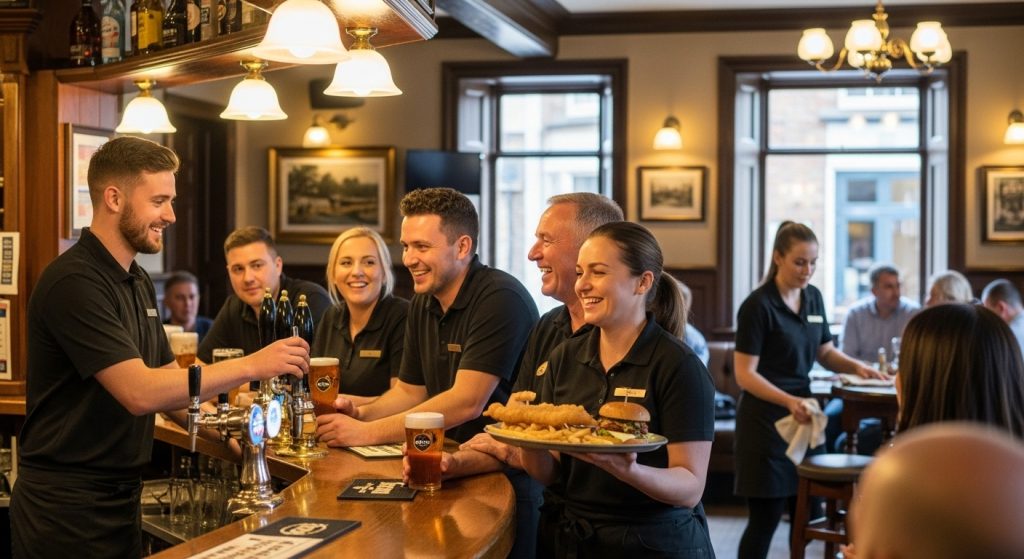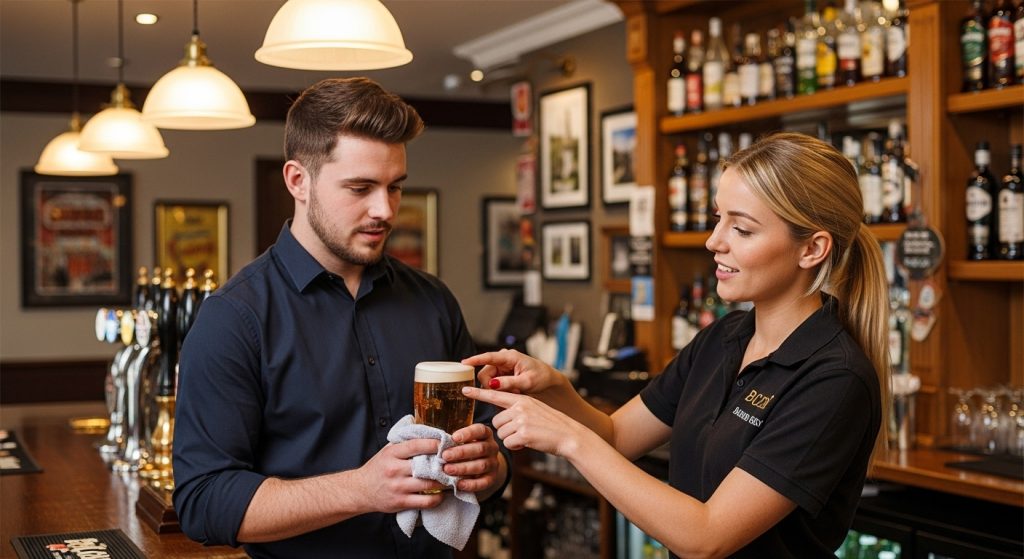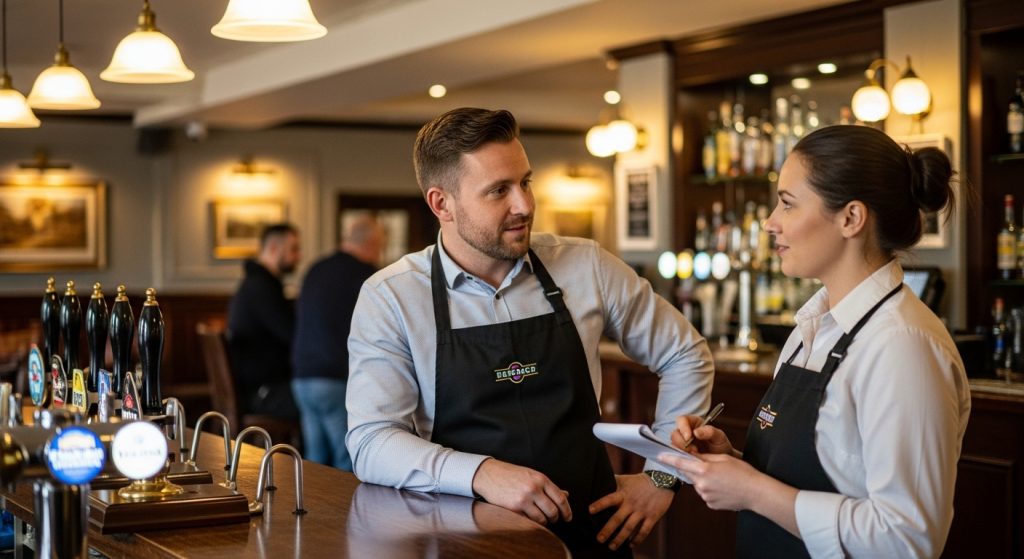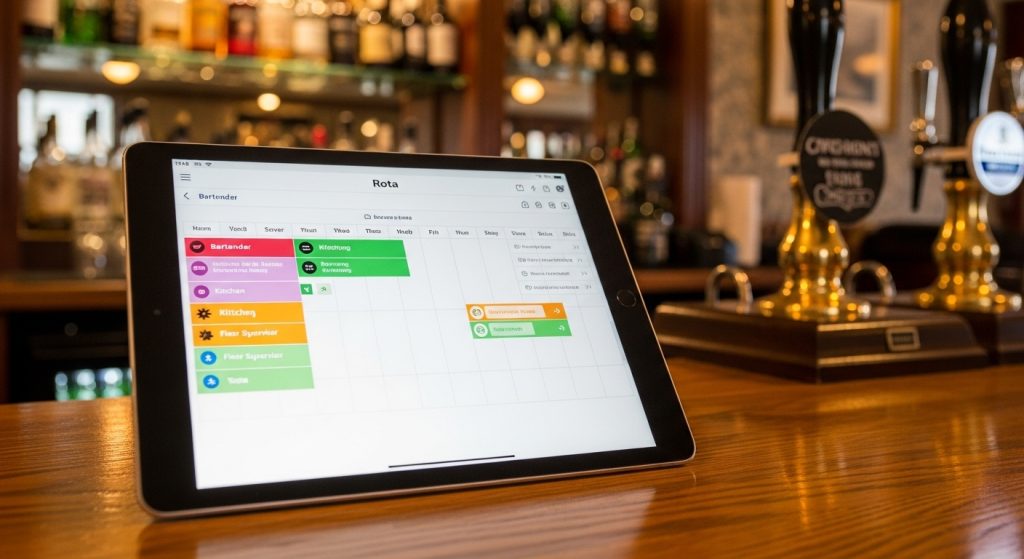
In the vibrant, fast-paced world of UK pubs, your staff are the heart and soul of your establishment. They’re the friendly faces, the skilled hands, and the dedicated individuals who keep the pints pouring and the customers happy. Yet, retaining these invaluable team members has become one of the most pressing challenges for landlords and managers across the country. High staff turnover isn’t just a headache; it’s a significant drain on resources, morale, and ultimately, your bottom line. This ultimate guide will equip you with proven, UK-specific strategies to combat the revolving door phenomenon, build a loyal, high-performing team, and transform your pub into a workplace where people genuinely want to stay and thrive. Ready to stop the churn and start building a stable, successful future? Dive in, and for practical tools to get started, explore our free resources at SmartPubTools.net/freebies.
TL;DR: Key Takeaways for Pub Staff Retention
- High staff turnover in UK pubs costs thousands and impacts morale and service quality.
- Go beyond minimum wage; offer competitive pay, transparent tips, and valuable benefits.
- Invest in staff training and development pathways to show you value their future.
- Foster a positive, inclusive work culture with strong leadership and mental health support.
- Implement effective communication channels and feedback mechanisms to make staff feel heard.
- Offer flexible working, predictable rotas, and respect work-life balance to reduce stress and improve loyalty.
Table of Contents
- Understanding the UK Pub Staff Retention Challenge: Why Do Good People Leave?
- Competitive Pay & Benefits: Going Beyond the Minimum to Attract & Keep Talent
- Training & Development: Investing in Your Team’s Future, Not Just Your Pub’s Present
- Creating a Positive Work Culture: Building a Pub Family, Not Just a Workforce
- Effective Communication & Feedback: The Two-Way Street to Staff Loyalty
- Flexible Working & Work-Life Balance: A Modern Necessity for Retaining Pub Staff
- Recognition & Rewards: Making Your Pub Staff Feel Truly Valued
- Onboarding & Offboarding: Setting the Stage for Success and Learning from Departures
- Leveraging Technology for Retention: Smart Tools for a Smarter Pub
- Case Study: The ‘Old Boar’s Head’ Transforms Retention
- Your Pub Staff Retention Toolkit & Checklist
- Key Facts About UK Pub Staff Retention
- Frequently Asked Questions (FAQs) for Landlords & Managers
- Conclusion: Build a Loyal Team, Build a Better Pub
Understanding the UK Pub Staff Retention Challenge: Why Do Good People Leave?
Before we can fix the problem of staff leaving, we need to understand why they’re leaving. The UK pub industry, while incredibly rewarding, often presents unique challenges that contribute to high turnover. Long, unsociable hours, demanding customers, physically taxing work, and often, a perceived lack of career progression can all play a part. The cost of living crisis has exacerbated issues around pay, with many staff struggling to make ends meet on minimum wage roles, especially in urban areas like London or Manchester where rents are sky-high. Furthermore, the pandemic shifted perspectives; many hospitality workers sought roles with better work-life balance or perceived stability.
Research from organisations like UKHospitality and the CIPD consistently points to several key drivers. Poor management, lack of recognition, insufficient training, and a toxic work culture are frequently cited. Young workers, who often form a significant portion of pub teams, are particularly sensitive to these factors and are less likely to tolerate poor conditions. They often seek roles that offer flexibility, a sense of purpose, and opportunities to learn and grow. Ignoring these underlying issues is like patching a leaky roof with a sticky note – it might hold for a moment, but the fundamental problem remains. Understanding these root causes is the first, crucial step towards developing effective, long-term retention strategies that resonate with today’s workforce.
Competitive Pay & Benefits: Going Beyond the Minimum to Attract & Keep Talent
Let’s be blunt: in today’s competitive UK job market, simply paying the National Living Wage (NLW) is often not enough to attract and retain the best talent. While it’s the legal minimum, many pubs are finding they need to offer more to stand out. Consider paying above the NLW, perhaps aligning with the ‘Real Living Wage’ as set by the Living Wage Foundation, which is voluntarily paid by employers who believe their staff deserve a wage that meets everyday needs. This demonstrates a genuine commitment to your team’s financial well-being and can significantly reduce financial stress, a major contributor to staff churn.
Beyond the hourly rate, think about a comprehensive benefits package. This doesn’t have to mean private health insurance, but it could include:
- Transparent Tronc System: If you operate a tronc system for tips, ensure it’s fair, transparent, and clearly communicated. Staff need to feel they are genuinely benefiting from their hard work.
- Staff Discounts: Generous discounts on food and drink for staff and their families, even when they’re not working, can be a huge perk.
- Pension Contributions: While legally mandated, ensuring staff understand and value their pension can be a retention tool.
- Healthcare Cash Plans: Affordable plans that help staff cover everyday health costs like dental or optical care can be a strong differentiator.
- Performance-Related Bonuses: Small, achievable bonuses for hitting targets (e.g., customer satisfaction scores, upselling) can incentivise and reward.
Remember, your staff are often your biggest advocates. When they feel fairly compensated and valued, they’re more likely to stay, speak positively about your pub, and deliver exceptional service. Regularly review your compensation structure against local competitors in your area, whether it’s a bustling city centre pub in Birmingham or a quiet village inn in the Cotswolds, to ensure you remain competitive.
Training & Development: Investing in Your Team’s Future, Not Just Your Pub’s Present
Investing in your team’s development isn’t just about making them better at their jobs; it’s about showing them you value their future. For many pub staff, particularly younger employees, the opportunity to learn new skills and progress within the hospitality industry is a powerful motivator. This doesn’t mean you need to send everyone on expensive external courses, though those have their place.
Start with robust internal training. This could include:
- Comprehensive Onboarding: Beyond just showing them where the tills are, provide structured training on your pub’s specific operating procedures, brand values, and customer service expectations.
- Skill Development: Offer training in areas like cellar management (essential for Cask Marque standards), cocktail making, wine knowledge, food safety (Level 2 Food Hygiene is a must), and advanced customer service techniques. Consider supporting staff to gain their Personal Licence if they show management potential.
- Cross-Training: Allow staff to learn different roles – working behind the bar, waiting tables, or even assisting in the kitchen. This not only makes your team more versatile but also gives them a broader understanding and appreciation of the entire pub operation.
- Leadership & Management Training: For aspiring managers, provide opportunities to shadow current managers, take on supervisory duties, and participate in decision-making. External courses, such as those offered by the Institute of Hospitality or specific WSET (Wine & Spirit Education Trust) qualifications, can be excellent for those looking to specialise.

By creating clear pathways for progression and actively supporting your staff’s professional growth, you transform a ‘job’ into a ‘career opportunity. This significantly increases loyalty and reduces the likelihood of them looking elsewhere for development. It also creates a succession plan for your pub, ensuring you always have a pipeline of skilled individuals ready to step up.
Creating a Positive Work Culture: Building a Pub Family, Not Just a Workforce
A pub is more than just a place to work; it’s a community. The atmosphere you cultivate among your staff is just as important as the atmosphere you create for your customers. A positive work culture is one where staff feel respected, supported, and safe. It’s about teamwork, mutual respect, and a shared sense of purpose. Conversely, a toxic culture – characterised by bullying, favouritism, or a lack of support – is a guaranteed way to drive staff away, no matter how good the pay.
Key elements of a positive pub culture include:
- Respect & Inclusivity: Ensure everyone feels valued, regardless of their role, background, or experience. Implement a clear zero-tolerance policy for harassment, discrimination, or bullying.
- Teamwork & Collaboration: Foster an environment where staff help each other out, especially during busy shifts. Encourage team-building activities, even simple ones like a post-shift drink together or a staff social event once a quarter.
- Supportive Leadership: As a landlord or manager, you set the tone. Be approachable, empathetic, and lead by example. Support your team when things go wrong and celebrate their successes.
- Mental Health Awareness: The hospitality industry can be high-pressure. Provide resources or signposting to mental health support organisations like Hospitality Action. Create an environment where staff feel comfortable discussing their mental well-being without fear of judgment.
- Fairness & Consistency: Apply rules and policies consistently across the board. Nothing erodes morale faster than perceived unfairness or favouritism.

A great work culture reduces stress, boosts morale, and transforms colleagues into a cohesive team. When staff feel like they belong and are part of something bigger, they’re far more likely to commit to your pub long-term. This cultural investment pays dividends in reduced turnover and a more harmonious, productive workplace.
Effective Communication & Feedback: The Two-Way Street to Staff Loyalty
Effective communication is the bedrock of any successful relationship, and that includes the relationship between management and staff. Many pub staff leave because they feel unheard, misunderstood, or that their feedback isn’t valued. As a landlord or manager, establishing clear, open channels of communication is paramount.
- Regular Check-ins: Beyond daily briefings, schedule regular, informal one-on-one check-ins with staff. These don’t have to be formal reviews but opportunities to ask how they’re doing, if they have any concerns, or if there’s anything you can do to support them.
- Team Meetings: Hold short, focused team meetings (e.g., weekly or fortnightly) to discuss upcoming events, service improvements, or address any operational issues. Encourage staff to contribute ideas and solutions.
- Feedback Mechanisms: Create multiple avenues for staff to provide feedback. This could be an anonymous suggestion box, a dedicated email address, or regular staff surveys. Crucially, act on the feedback and communicate what actions you’re taking.
- Constructive Feedback: When providing feedback to staff, focus on behaviour, not personality. Be specific, timely, and offer solutions or support for improvement. Always balance constructive criticism with recognition for good work.
- Transparency: Be as transparent as possible about business performance, challenges, and future plans. When staff understand the ‘why’ behind decisions, they’re more likely to buy in and feel like valued members of the team.
- Open-Door Policy: Make it clear that your door is always open for staff to discuss concerns or ideas. This builds trust and shows you’re approachable.

Utilising tools like SmartPubTools.net’s communication features can streamline this process, allowing you to share rotas, announcements, and gather feedback efficiently. When staff feel heard and understood, their engagement and loyalty skyrocket. They become partners in your pub’s success, not just employees.
Flexible Working & Work-Life Balance: A Modern Necessity for Retaining Pub Staff
The traditional image of pub work – long, rigid hours with little flexibility – is becoming increasingly outdated and unsustainable for many. In a post-pandemic world, work-life balance is a top priority for employees across all sectors, and hospitality is no exception. Offering flexibility can be a game-changer for pub staff retention, particularly for those with family commitments, studying, or other responsibilities.
Consider implementing:
- Predictable Rotas: While flexibility is key, so is predictability. Staff need to plan their lives. Aim to publish rotas well in advance (e.g., two weeks) and stick to them as much as possible. SmartPubTools.net can help you build and share rotas efficiently, taking into account staff availability.
- Shift Swapping: Empower staff to manage their own shifts by allowing them to swap with colleagues (with manager approval). This gives them control and reduces the burden on management.
- Part-Time & Flexible Hours: Not everyone wants or needs full-time hours. Offering a variety of contract types, including part-time, evening-only, or weekend-only shifts, can attract a wider pool of talent and accommodate diverse needs.
- Understanding Personal Needs: Be empathetic to staff requests for specific days off for important events, appointments, or emergencies. A little understanding goes a long way in building loyalty.
- Compressed Hours/Annualised Hours (where feasible): For some roles, exploring options like working longer shifts over fewer days, or annualised hours contracts, could be an attractive proposition.

By demonstrating that you understand and respect your staff’s lives outside of work, you build a foundation of trust and appreciation. This flexibility, when managed effectively, can significantly reduce stress, improve morale, and make your pub a far more attractive place to work than competitors who cling to rigid, outdated scheduling practices.
Recognition & Rewards: Making Your Pub Staff Feel Truly Valued
Everyone wants to feel appreciated, and your pub staff are no different. In the busy, often thankless world of hospitality, taking the time to recognise and reward your team’s efforts can have a profound impact on their morale and commitment. Recognition doesn’t always have to come in the form of a monetary bonus; often, a heartfelt ‘thank you’ or public acknowledgment can be just as powerful.
Ideas for effective recognition and rewards:
- Verbal Praise: Simple, sincere ‘thank yous’ for a job well done, especially after a particularly busy shift or for handling a difficult customer with grace.
- Employee of the Month/Quarter: Implement a formal program where staff nominate colleagues, or management selects an outstanding individual. Offer a small prize, a certificate, or a dedicated parking spot for a month.
- Spot Bonuses: Small, unexpected bonuses or gift vouchers for exceptional performance or going above and beyond.
- Public Recognition: Shout out great work in team meetings, on a staff notice board, or even on your pub’s internal communication channel.
- Celebrating Milestones: Acknowledge work anniversaries, birthdays, or personal achievements. A small card and a cake can make a big difference.
- Development Opportunities as Rewards: For top performers, offer a chance to attend a specific training course (e.g., a masterclass in mixology, a brewery tour) as a reward.
- Team Outings: Organise a staff social event, a meal out, or a fun activity outside of work hours to foster camaraderie and reward collective effort.
Regular, genuine recognition creates a positive feedback loop, encouraging staff to maintain high standards and feel valued for their contributions. It reinforces positive behaviours and builds a culture where hard work is seen and appreciated, directly contributing to higher job satisfaction and longer tenure.
Onboarding & Offboarding: Setting the Stage for Success and Learning from Departures
The moments an employee joins your team and the moments they leave are critical touchpoints that often get overlooked in terms of retention. A strong onboarding process sets new hires up for success and makes them feel welcome. A thoughtful offboarding process, including exit interviews, provides invaluable insights for improving retention for future staff.
Effective Onboarding:
- Pre-boarding: Before their first day, send a welcome email with essential information (start time, what to wear, who to report to).
- Warm Welcome: Ensure someone is ready to greet them on their first day. Introduce them to the team and give them a tour.
- Structured Induction: Don’t just throw them behind the bar. Provide a clear schedule for their first few days/weeks, covering training on tills, products, procedures, and health & safety.
- Mentorship/Buddy System: Pair new hires with an experienced, friendly colleague (a ‘pub buddy’) who can show them the ropes, answer questions, and help them integrate.
- Clear Expectations: Clearly communicate job roles, responsibilities, performance expectations, and your pub’s values from day one.
Thoughtful Offboarding:
- Exit Interviews: When staff do leave, conduct a confidential exit interview. Ask open-ended questions about their experience, what they enjoyed, what could be improved, and why they’re moving on. This feedback is gold dust for identifying areas for improvement in your retention strategy.
- Maintain Professionalism: Even if the departure is difficult, maintain professionalism. A positive experience, even when leaving, can lead to positive word-of-mouth for your pub as an employer.
- Learning from Departures: Analyse trends from exit interviews. Are staff consistently citing similar reasons for leaving? Use this data to adjust your policies and practices. SmartPubTools.net can help you track staff data, making it easier to identify patterns in turnover.
By managing these bookends of the employee lifecycle with care and strategic intent, you not only improve the experience for the individuals involved but also gather crucial intelligence that can proactively strengthen your overall staff retention efforts.
Leveraging Technology for Retention: Smart Tools for a Smarter Pub
In the modern pub, technology isn’t just about faster tills or better stock control; it’s a powerful ally in your staff retention efforts. Smart tools can streamline operations, improve communication, and empower your team, directly contributing to a more positive and efficient working environment.
Here’s how leveraging technology, like SmartPubTools.net, can significantly boost retention:
- Rota Management & Flexibility: Manual rotas are a headache for everyone. Digital rota software allows you to create and share rotas efficiently, instantly communicate changes, and empower staff to input availability and request shift swaps. This transparency and flexibility are crucial for work-life balance and reducing scheduling conflicts, a common cause of frustration.
- Streamlined Communication: Integrated messaging platforms within your pub management system can replace chaotic WhatsApp groups or missed messages. You can send critical updates, share daily specials, disseminate training materials, and gather quick feedback, ensuring everyone is on the same page.
- Training & Development Tracking: Online learning modules and platforms can deliver consistent training on everything from food hygiene to new menu items. Tracking completion and progress within a system shows staff their development is being invested in and provides a clear record of their skills. This is vital for career progression discussions.
- Performance Management & Feedback: Digital tools can facilitate regular performance reviews, goal setting, and 360-degree feedback. This makes the feedback process more structured, less intimidating, and provides a clear record of an employee’s growth and areas for improvement.
- Task Management & Accountability: Clear task lists and checklists, managed digitally, ensure everyone knows their responsibilities, reducing confusion and fostering a sense of shared purpose. This also helps new staff quickly get up to speed.
- Payroll & HR Integration: Seamless integration with payroll ensures accurate and timely payments, a fundamental aspect of staff satisfaction. Digital HR features can manage holiday requests, personal details, and other administrative tasks, freeing up both management and staff time.
By embracing technology, you reduce administrative burdens, improve operational efficiency, and, most importantly, create a more organised, transparent, and supportive environment for your staff. This demonstrates that you are a forward-thinking employer who values their time and well-being, making your pub a more attractive place to work and stay. Ready to see how SmartPubTools.net can transform your pub’s operations and staff retention? Start your 14-day free trial of SmartPubTools today!
Case Study: The ‘Old Boar’s Head’ Transforms Retention
The ‘Old Boar’s Head’ in rural Yorkshire, a traditional village pub, faced a common dilemma: high staff turnover, particularly among younger bar staff and kitchen assistants. Landlord, Sarah Jenkins, was constantly training new recruits, impacting service quality and her own time. After implementing a new retention strategy, inspired by principles similar to those in this guide, Sarah saw a dramatic improvement. Firstly, she introduced a ‘Living Wage Plus’ policy, paying 50p above the real Living Wage, coupled with a transparent tronc system for tips, directly linking effort to reward. Secondly, she invested in a structured onboarding program, pairing new hires with experienced ‘pub buddies’ for their first month. Beyond pay, Sarah focused on culture. She introduced monthly ‘Team Huddles’ – short, informal meetings where staff could voice concerns, suggest improvements, and celebrate successes. She also invested in basic online training modules for cellar management, food hygiene, and customer service, offering small bonuses for completion. Crucially, she embraced flexibility, using SmartPubTools.net’s rota management to allow staff to easily swap shifts and request specific days off, giving them more control over their work-life balance. Within 18 months, the Old Boar’s Head reduced its staff turnover by over 60%. Morale soared, customer reviews improved, and Sarah spent less time on recruitment and more on growing her business. She even saw two junior staff members progress to assistant manager roles, a testament to her investment in their development. The pub became known locally not just for its real ale, but for being a great place to work.
Your Pub Staff Retention Toolkit & Checklist
Use this actionable checklist to kickstart your pub’s staff retention strategy:
- Review your current pay and benefits package against local competitors to ensure competitiveness.
- Implement a transparent tronc system for tips, if applicable, and clearly communicate how it works.
- Develop a structured onboarding program for new hires, including a ‘buddy system’.
- Identify key training needs and offer opportunities for skill development (e.g., cellar management, cocktail making).
- Schedule regular one-on-one check-ins with staff to discuss their well-being and feedback.
- Introduce a formal or informal recognition program (e.g., ‘Employee of the Month’, regular verbal praise).
- Utilise a digital rota management system (like SmartPubTools.net) to offer flexibility and predictability.
- Conduct anonymous staff surveys or ‘stay interviews’ to gather honest feedback on your pub’s culture.
- Establish clear policies against harassment and bullying, ensuring a safe and respectful workplace.
- Implement an exit interview process to learn from departing staff and identify areas for improvement.
- Explore opportunities for cross-training to make staff more versatile and engaged.
- Signpost mental health support resources for your team.
- Action Item: Ready to streamline your pub’s operations and boost staff retention? Start your 14-day free trial of SmartPubTools today! and discover how our integrated solutions can make a real difference!
Key Facts About UK Pub Staff Retention
| Label | Value | Source |
|---|---|---|
| Average Hospitality Turnover Rate (UK) | Around 30-40% annually (pre-pandemic), with some areas significantly higher. | People 1st / UKHospitality |
| Cost to Replace a Front-of-House Staff Member | Estimated £3,000 – £5,000 (including recruitment, onboarding, lost productivity). | Oxford Economics / HR Review |
| Proportion of Hospitality Workers Considering Leaving | Over 50% have considered leaving the industry due to pay, hours, or work-life balance. | Caterer.com |
| National Living Wage (23+ years, April 2024) | £11.44 per hour. | Gov.uk |
| Impact of Good Onboarding on Retention | Can improve first-year retention by up to 50%. | The Aberdeen Group |
| Importance of Training for Staff Retention | Organisations investing in training report higher employee engagement and lower turnover. | CIPD |
Frequently Asked Questions (FAQs) for Landlords & Managers
Q: Is offering higher wages the only way to retain pub staff in the current UK market?A: While competitive pay is crucial, especially with the rising cost of living in the UK, it’s not the only factor. Many studies show that a positive work environment, opportunities for growth, feeling valued, and work-life balance are equally, if not more, important. Landlords should focus on a holistic approach that combines fair compensation with a great culture and development opportunities.Q: I’m a busy landlord; where should I start with improving my pub’s staff retention?A: Begin by conducting anonymous staff surveys or holding informal ‘stay interviews’ to understand why your current staff choose to stay and what might make them leave. Look for common themes in feedback. Review your current pay and benefits package against local competitors. Implement a structured onboarding process and ensure regular, constructive feedback is provided. Small, consistent efforts across several areas often yield the best results.Q: Can small, independent pubs really offer meaningful career development opportunities?A: Yes, absolutely. Even small pubs can offer development. This could include formal training in areas like cellar management, personal license acquisition, or advanced cocktail making. It also encompasses informal mentorship, delegating more responsibility, or supporting staff with online courses. Showing a commitment to their growth, even if it’s just a few hours a month, can significantly boost loyalty.Q: What are the hidden costs of high staff turnover in a UK pub?A: High staff turnover is incredibly costly. It includes direct costs like recruitment fees (advertising, agency fees), onboarding expenses (training time, uniform), and administrative overhead. Indirect costs are often higher: reduced productivity, lower service quality, negative impact on team morale, loss of institutional knowledge, and potential damage to your pub’s reputation. Industry estimates suggest the cost of replacing a single employee can be 1.5 to 2 times their annual salary.Q: How can I support my staff’s mental health and work-life balance, especially with the demanding nature of pub work?A: To address this, focus on creating a supportive and flexible environment. Use technology like SmartPubTools.net for transparent rota management, allowing staff to input availability and swap shifts easily. Offer mental health support resources, even if it’s signposting to external charities like Hospitality Action. Foster a culture where staff feel comfortable discussing personal challenges and where their well-being is genuinely prioritised. Regular check-ins and an open-door policy can help identify issues before they escalate.
Conclusion: Build a Loyal Team, Build a Better Pub
Mastering pub staff retention isn’t just about reducing costs; it’s about building a thriving, resilient pub business. By investing in your team’s well-being, development, and sense of belonging, you create a positive cycle that benefits everyone. A happy, skilled, and loyal team translates directly into better customer service, a more vibrant atmosphere, and ultimately, a more profitable pub. Don’t view retention as a challenge, but as your greatest opportunity for sustainable success. Start implementing these strategies today and watch your pub flourish. For more practical tools and resources, remember to visit SmartPubTools.net.
Ready to Transform Your Pub’s Staff Retention?
Stop the revolving door and start building a loyal, high-performing team today. Download our comprehensive Pub Staff Retention Toolkit & Template Pack to get actionable strategies, checklists, and ready-to-use templates.
✅ Reduce Turnover: Implement proven strategies to keep your best staff.
✅ Boost Morale: Create a positive, supportive work environment.
✅ Save Time & Money: Cut recruitment costs and improve efficiency.
✅ Streamline Operations: Discover how SmartPubTools.net can simplify rota, communication, and HR.
And for a powerful, all-in-one solution to market your pub more effectively, including advanced rota and communication features, Start Your 14-Day Free Trial of SmartPubTools!
